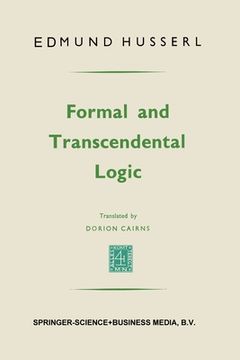Share
Formal and transcendental logic (in English)
Edmund Husserl
(Author)
·
Springer
· Paperback
Formal and transcendental logic (in English) - Husserl, Edmund
$ 93.79
$ 99.00
You save: $ 5.21
Choose the list to add your product or create one New List
✓ Product added successfully to the Wishlist.
Go to My WishlistsIt will be shipped from our warehouse between
Tuesday, June 04 and
Wednesday, June 05.
You will receive it anywhere in United States between 1 and 3 business days after shipment.
Synopsis "Formal and transcendental logic (in English)"
Preparatory Considerations.- I / The Structures and the Sphere of Objective Formal Logic.- 1. Formal logic as apophantic analytics.- 2. Formal apophantics, formal mathematics.- 3. Theory of deductive systems and theory of multiplicities.- 4. Focusing on objects and focusing on judgments.- 5. Apophantics, as theory of sense, and truthlogic.- II / From Formal to Transcendental Logic.- 1. Psychologism and the laying of a transcendental foundation for logic.- 2. Initial questions of transcendental-logic: problems concerning fundamental concepts.- 3. The idealizing presuppositions of logic and the constitutive criticism of them.- 4. Evidential criticism of logical principles carried back to evidential criticism of experience.- 5. The subjective grounding of logic as a problem belonging to transcendental philosophy.- 6. Transcendental phenomenology and intentional psychology. The problem of transcendental psychologism.- 7. Objective logic and the phenomenology of reason.- Conclusion.- Appendix I / Syntactical Forms and Syntactical Stuffs; Core-Forms and Core-Stuffs.- 1. The articulation of predicative judgments.- 2. Relatedness to subject-matter in judgments.- 3. Pure forms and pure stuffs.- 4. Lower and higher forms. Their sense-relation to one another.- 5. The self-contained functional unity of the self-sufficient apophansis. Division of the combination-forms of wholes into copulatives and conjunctions.- 6. Transition to the broadest categorial sphere.- a. Universality of the combination-forms that we have distinguished.- b. The distinctions connected with articulation can be made throughout the entire categorial sphere.- c. The amplified concept of the categorial proposition contrasted with the concept of the proposition in the old apophantic analytics.- 7. Syntactical forms, syntactical stuffs, syntaxes.- 8. Syntagma and member. Self-sufficient judgments, and likewise judgments in the amplified sense, as syntagmas.- 9. The "judgment-content" as the syntactical stuff of the judgment qua syntagma.- 10. Levels of syntactical forming.- 11. Non-syntactical forms and stuffs - exhibited within the pure syntactical stuffs.- 12. The core-formation, with core-stuff and core-form.- 13. Pre-eminence of the substantival category. Substantivation.- 14. Transition to complications.- 15. The concept of the "term" in traditional formal logic.- Appendix II / The Phenomenological Constitution of the Judgment. Originally Active Judging and Its Secondary Modifications.- 1. Active judging, as generating objects themselves, contrasted with its secondary modifications.- 2. From the general theory of intentionality.- a. Original consciousness and intentional modification. Static intentional explication. Explication of the "meaning" and of the meant "itself." The multiplicity of possible modes of consciousness of the Same.- b. Intentional explication of genesis. The genetic, as well as static, originality of the experiencing manners of givenness. The "primal instituting" of "apperception" with respect to every object-category.- c. The time-form of intentional genesis and the constitution of that form. Retentional modification Sedimentation in the inconspicuous substratum (unconsciousness).- 3. Non-original manners of givenness of the judgment.- a. The retentional form as the intrinsically first form of "secondary sensuousness". The livingly changing constitution of a many-membered judgment.- b. Passive recollection and its constitutional effect for the judgment as an abiding unity.- c. The emergence of something that comes to mind apperceptionally is analogous to something coming to mind after the fashion of passive recollection.- 4. The essential possibilities of activating passive manners of givenness.- 5. The fundamental types of originally generative judging and of any judging whatever.- 6. Indistinct verbal judging and its function.- 7. The superiority of retentional and recollectiona
- 0% (0)
- 0% (0)
- 0% (0)
- 0% (0)
- 0% (0)
All books in our catalog are Original.
The book is written in English.
The binding of this edition is Paperback.
✓ Producto agregado correctamente al carro, Ir a Pagar.

